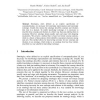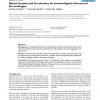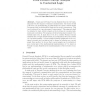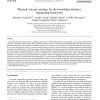18 search results - page 2 / 4 » A Formal Theory for Describing Action Concepts in Terminolog... |
CLA
2004
13 years 7 months ago
2004
Ontologies, often defined as an explicit specification of conceptualization, are necessary for knowledge representation and knowledge exchange. Usually this means that ontology des...
BMCBI
2007
13 years 5 months ago
2007
Background: An adequate and expressive ontological representation of biological organisms and their parts requires formal reasoning mechanisms for their relations of physical aggr...
ATAL
2010
Springer
13 years 5 months ago
2010
Springer
One of the most challenging aspects of reasoning, planning, and acting in a multi-agent domain is reasoning about what the agents know about the knowledge of their fellows, and to...
FCA
2005
Springer
13 years 11 months ago
2005
Springer
Abstract. A main goal of Formal Concept Analysis from its very beginning has been the support of rational communication. The source of this goal lies in our understanding of mathem...
AEI
2004
13 years 5 months ago
2004
Knowledge intensive engineering aims at flexible applications of a variety of product life cycle knowledge, such as design, manufacturing, operations, maintenance, and recycling. ...




